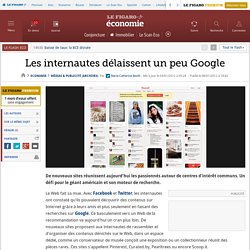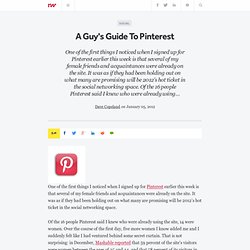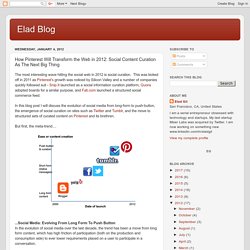

Médias & Publicité : Les internautes délaissent un peu Google. De nouveaux sites réunissent aujourd'hui les passionnés autour de centres d'intérêt communs.

Un défi pour le géant américain et son moteur de recherche. Le Web fait sa mue. Avec Facebook et Twitter, les internautes ont constaté qu'ils pouvaient découvrir des contenus sur Internet grâce à leurs amis et plus seulement en faisant des recherches sur Google. Ce basculement vers un Web de la recommandation va aujourd'hui un cran plus loin. De nouveaux sites proposent aux internautes de rassembler et d'organiser des contenus dénichés sur le Web, dans un espace dédié, comme un conservateur de musée conçoit une exposition ou un collectionneur réunit des pièces rares. Aux États-Unis, Pinterest est devenu un véritable phénomène. D'autres services, dont le projet de départ n'était pas de créer de tels «index» thématiques du Web, y ont été poussés par leurs utilisateurs. De même, le site de questions-réponses Quora a adapté son offre en lançant le service «Boards» fin décembre 2011.
Pinterest: Behind the Design of an Addictive Visual Network. Ever find yourself in the rabbit hole of the internet, bookmarking and screengrabbing things you want to buy or images that inspire you?

Well, judging from Pinterest's hockey-stick growth, you're not alone in your digital collecting and curating. The invite-only social discovery platform launched in March 2010, the brainchild of Paul Sciarra, Evan Sharp and Ben Silbermann, with the mission to "connect everyone in the world through the 'things' they find interesting," opining that books, recipes and items can bridge the gap between strangers. In October, the site surpassed 421 million pageviews, which means that each of its 3 million users are spending quite a bit of time there, pinning and organizing images to help them plan their weddings, decorate their (oftentimes, dream) homes, create bucket lists and manage an inventory of favorite images — no small feat on the ever-growing web.
You are what you curate: why Pinterest is hawt. Evolution of social media by Elad Gill (graphic courtesy of Elad Gill) Updated: The new hot social thing on the web these days is a Palo Alto, Calif.

–based company started by Ben Silbermann, Paul Sciarra and Evan Sharp. (I incorrectly described this group as ex-Facebookers. My apologies for the error.) It is called Pinterest and it is about the concept of curation — a much abused phrase in Silicon Valley. 2012 will likely see an acceleration of structured, push button, social curation across the web.
The way I see it, Pinterest is yet another example of basic human behavior’s being transposed on to the web. Back when I was young, my cousins would cut out photos, ads and visuals from fashion and lifestyle magazines and create collages. In 2005, David Galbraith, a friend of mine who has a nasty habit of predicting the future before everyone else, built a service called Wists. A Guy's Guide To Pinterest. One of the first things I noticed when I signed up for Pinterest earlier this week is that several of my female friends and acquaintances were already on the site.

It was as if they had been holding out on what many are promising will be 2012's hot ticket in the social networking space. Of the 16 people Pinterest said I knew who were already using the site, 14 were women. Over the course of the first day, five more women I know added me and I suddenly felt like I had ventured behind some secret curtain. That is not surprising: in December, Mashable reported that 59 percent of the site's visitors were women between the ages of 25 and 44, and that 58 percent of its visitors in the previous 12 weeks had been female. Pinterest is a visual pin board where you can collect images you find on the Web and arrange them in categories with links back to the original site. "Our goal is to connect everyone in the world through the 'things' they find interesting. Getting Going. How Pinterest Will Transform the Web in 2012: Social Content Curation As The Next Big Thing.
The most interesting wave hitting the social web in 2012 is social curation.

This was kicked off in 2011 as Pinterest's growth was noticed by Silicon Valley and a number of companies quickly followed suit - Snip.It launched as a social information curation platform, Quora adopted boards for a similar purpose, and Fab.com launched a structured social commerce feed. In this blog post I will discuss the evolution of social media from long-form to push-button, the emergence of social curation on sites such as Twitter and Tumblr, and the move to structured sets of curated content on Pinterest and its brethren. But first, the meta-trend.... ...Social Media: Evolving From Long Form To Push Button In the evolution of social media over the last decade, the trend has been a move from long form content, which has high friction of participation (both on the production and consumption side) to ever lower requirements placed on a user to participate in a conversation.